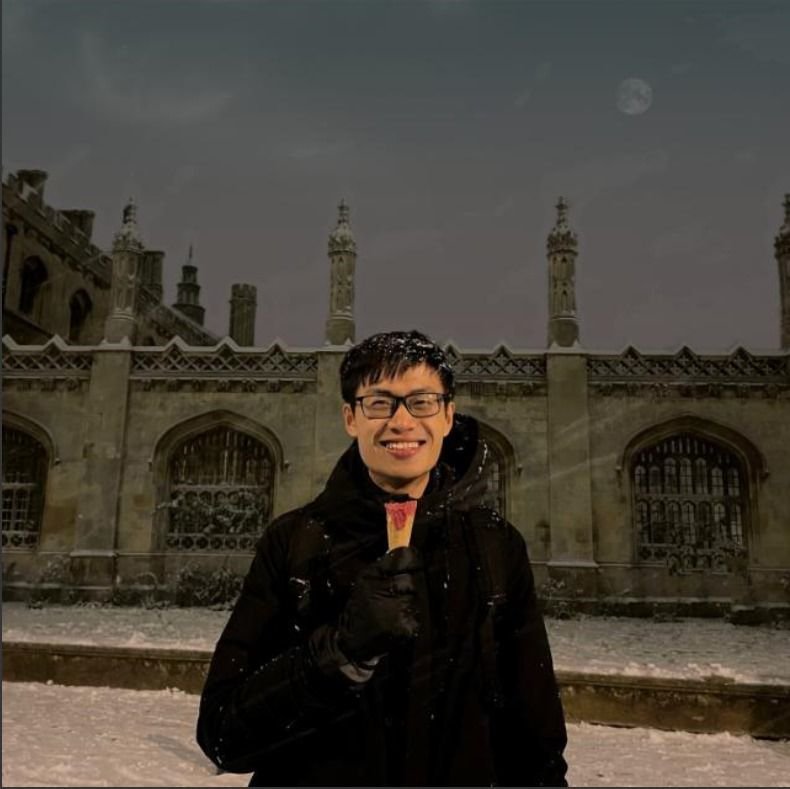Unveiling the Journey from Scientist to Entrepreneur: An Inspiring Dinner with Nobel Laureate Sir Gregory Winter
Written by Raina Xing and Tim Liu
Greg Winter studied Natural Sciences at Cambridge, where his passion for science sparked a romantic idea, wrapping hand-picked flowers in a metabolic pathway handout to capture a girl’s heart. He then went on to complete his PhD at the Laboratory of Molecular Biology and later became the Deputy Director of the LMB as well as the Master of Trinity College. During this time, Greg founded Cambridge Antibody Technology and Domantis, which were later acquired by AstraZeneca and GlaxoSmithKline respectively. Winter made his breakthrough in science with his technique to humanise mouse monoclonal antibodies and subsequently develop methodologies to produce fully human antibodies. Today, these techniques are used to make some of the world’s best-selling drugs, including Keytruda and Humira. Currently, the monoclonal antibody market is worth US$229 billion and is projected to triple in value in the next decade.
From Desperation to Determination
From early on, Winter was fascinated by the structure of proteins and nucleic acids and how they could be used to elucidate evolution. In 1984, he was attacked on his way to work, which led to nerve damage in his right arm. His arm became paralysed, and he was told by doctors it may never regain mobility. As a hands-on scientist working in the lab, the news was catastrophic, but he found that he could escape the pain by immersing himself in the world of protein structures, specifically antibodies, using computer graphics. Winter says it enabled him to step into another universe.
From Curiosity to Humanitarianism
While looking at antibody structures, Winter realised that antigen-binding loops might be transplantable from mouse to human antibodies, and he went on to design a method to “humanise” mouse antibodies for therapy. He saw this as both a technical and intellectual challenge. In due course, this technique revolutionised the use of antibodies in healthcare. The first patient, who was terminally ill and had already endured several rounds of chemotherapy, asked to meet the scientist behind the technology that would extend her life. She told Winter that she only needed two more months to live so that she could be there to support her ill husband before he passed away. Winter notes that he walked away from this encounter with a realisation of the importance of this research and an ignited desire to see it make a difference in healthcare. He was no longer just a curious scientist.
From Scientist to Entrepreneur
As Winter took on the challenge of turning his discoveries into medicine, he began to gain a broader perspective of where his research fitted. He learnt to wear different hats in different meetings with scientists, board members, and venture capitalists. He was not taught how to be an entrepreneur, or a businessman so he was forced to learn along the way. Winter found the transition difficult: management changes in industrial partners led to the termination of projects, board members became split, and everything happened at a fast and unpredictable pace. He says his success came from constantly asking questions and learning different crafts and he admits that, quite often, he did not know what would be successful; “VCs are sometimes more optimistic about your research” than you are yourself. “You may be running out of money and unsure, but people in your company are depending on you. There is no point moping around, you just need to keep pushing.”
From Disaster to Good Fortune
With his research funded by the Medical Research Council (MRC), Winter’s employers wanted to sell exclusive rights of his humanised antibody technique to Celltech. Opposed to giving the technology to just one company, Winter warned MRC and Celltech that he could not accept this and would rather destroy his own patent than do so. The Head of MRC wanted to fire him, but the director of the lab refused. In the end the MRC agreed to licence out the technology non-exclusively, though Celltech was also given an exclusive licence for making humanised antibodies against TNF. As events unfolded, Celltech’s exclusivity for all humanised antibodies against TNF later helped drive Peptech’s investment in his start-up company, Cambridge Antibody Technology (CAT). Peptech had originally wanted to develop a humanised anti-TNF antibody, but this was blocked by Celltech’s exclusive licence. CAT was able to present an alternative avenue by offering the technology to produce fully human antibodies, thereby bypassing the need for humanized ones. Peptech subsequently decided not to create an anti-TNF antibody following changes in management, leaving CAT free to enter a contract with BASF Pharma to develop the human antibody Humira. Patents provide both opportunities and obstacles.
From Academia to Industry (and back again)
Winter believes that “money is great and shouldn’t be despised." Commercialisation needs to be driven by money, and investors favour ideas with viable business plans. But the commercialisation of pharmaceutical drugs is very protracted even with sufficient money and resources. Winter favours easier regulatory hurdles and more experimentation for treatments for diseases that currently lack options.
As slow as the process of drug development is, Winter says that the processes of academia can be even slower. He jests about how, during his time as a Fellow of Trinity College, the biggest change he managed to make was to end the practice of decanting “regular” white wine, while in the commercial world, he founded a billion-dollar company. He said that many academics tend to steer away from the commercial world but that this needs to change as both worlds would benefit from such interactions and “to see ourselves as others see us.” For Winter, “it would be great if universities could offer the best PhD students a free year of business school.”
From the Past to the Future
In 1996, Winter left the board of Cambridge Antibody Technology because he felt increasingly uncomfortable about the proposed business plan for listing, and dissensions on the board. Looking back, he does not regret it: “Leaving was good for me.” People had said to him that the company would not be able to cope, but he said that by then the technology was good enough, and that “no one is indispensable, there will always be someone to fill the space.”
On reflection, Winter does not actually regret much at all. He says that he worked to the best of his ability and although there are things that could have been done differently or potential opportunities that could have led in new directions, many of the events that caused him stress ultimately led to good outcomes and collaborations. He mentions how he and a colleague had discussed the idea for the PCR technique well before its invention – and could have done it experimentally - but did not as they needed to focus on their existing projects to get publications. But he does not regret this as he reckons, he would have then been stuck in the DNA world and never gotten into protein and antibody engineering.
Winter often found himself working long hours and feeling mentally beaten down, but he just immersed himself and pushed through. “Sometimes you just have to work, work, work.” He says he wanted to be a good role model for his children, to be ambitious and focused, but he does wish he had spent more time with them growing up. Now, Winter still wants to see Bicycle Therapeutics succeed but is also focusing on spending more time with his grandchildren. Perhaps there is a lesson in balance here too.
Advice
Focus on the questions that have fundamental importance, not just something you find interesting.
Learn to cope with workplace politics, people are complicated, and it is difficult, but you just got to do it.
To be a good leader you first have to be a follower, a good follower.
When deciding where to base your company, you need to consider where investors will flow to. VCs are more often in the US than the UK.
Recommends the book From Breakthrough to Blockbuster: The Business of Biotechnology by Donald Drakeman, wishes the book has been written decades earlier when he could have used it.
Raina Xing
Raina Xing is a 3rd year medical student at King's College, Cambridge. She is currently pursuing an intercalated degree in Pharmacology, researching novel anti-thrombotic treatment mechanisms. Raina has been a member of the E-Lab community since 2023.
Tim Liu
Tim Liu is a medical student and full-stack engineer at Cambridge, Moorfields, and the Sanger Institute. He is passionate about improving front-end patient care through back-end biomedicine, data science, and technology. He blogs at timingliu.org.


